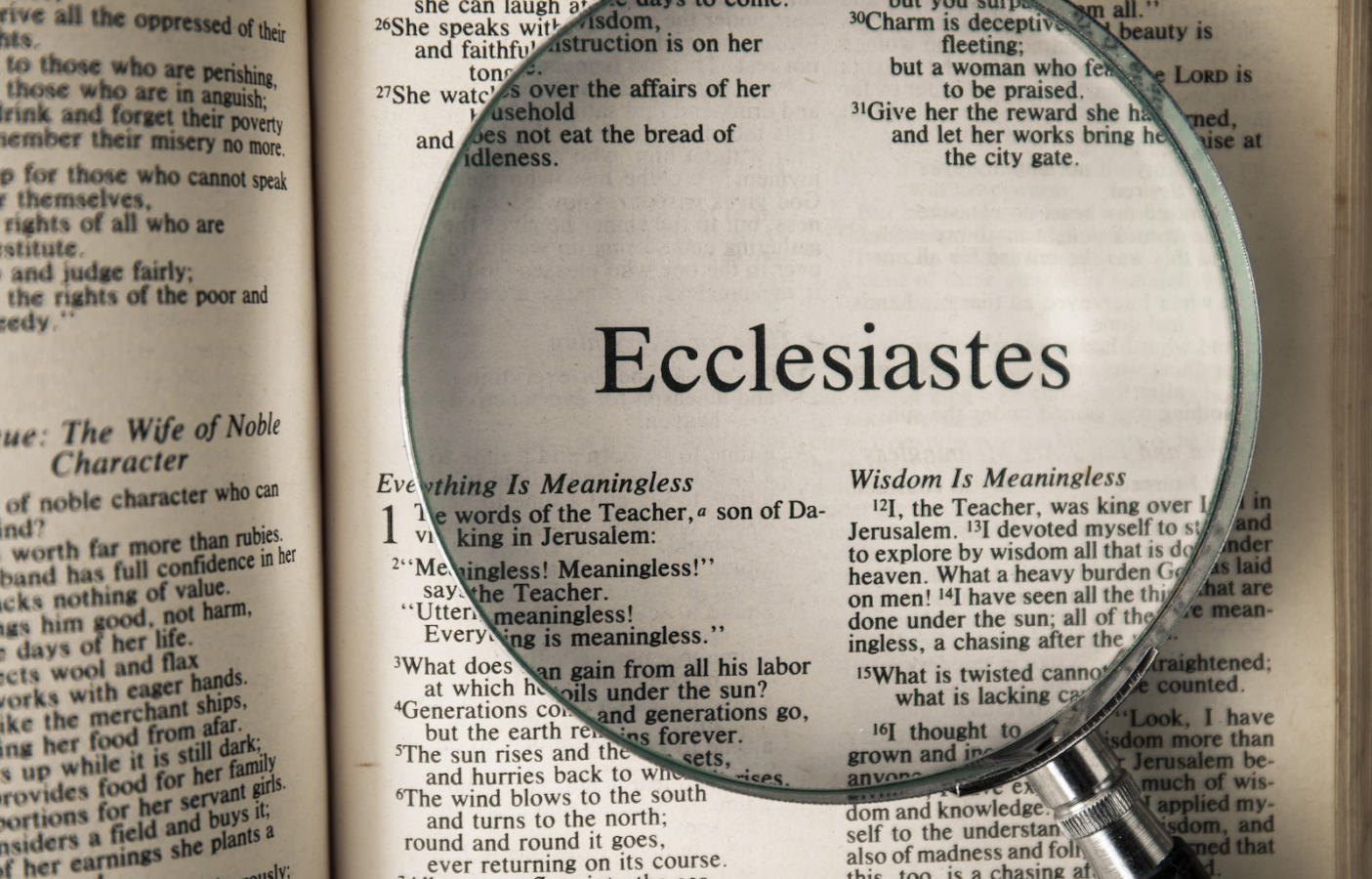Ecclesiastes is “the greatest single piece of literature I have known,” according to the American novelist Thomas Wolfe. So controversial that it was almost withdrawn from circulation by the rabbis, the story has engaged readers for over 2,000 years, its articulations part of a universal cultural inheritance: All is vanity. To everything there is a season. There is nothing new under the sun. All these and more come to us from Ecclesiastes.
Read the entire text of Ecclesiastes in English and Hebrew on Sefaria.
The book is the tale of a search for verifiable truths about life by someone named Kohelet. Written toward the end of the biblical period (300-200 BCE, as determined by the language of the text), the book uniquely applies the kinds of questions that bothered early Greek philosophers to a Jewish world of faith. The nexus of monotheism and reliance on individual search and judgement is basic to its eternal appeal.
Yet Ecclesiastes is not a philosophy. Because commentators across the centuries approached it as if it were, they were confounded by many contradictions in the text. But Kohelet is actually a story of one man’s search for absolutes in a world filled with doubt and contradiction. Once the book is seen in this way, a pattern of growth becomes visible and the book can be understood not as an encounter with a system of thought, but rather as the account of a quest. Kohelet was designed not to answer questions, but to raise them.
Kohelet is pictured in three stages of the search. In the first, he is portrayed as a king who has everything but still yearns for satisfaction. In the second, he becomes a wandering observer, concluding with the recommendation that the good life is one that seeks enjoyment. In the final section, Kohelet offers some retrospective thoughts as he approaches death.
Along the way, Kohelet dismisses the worth of many common social values. Wealth and hard work are deemed useless. Justice and wisdom seem to go unrewarded. Planning leads to naught. Political power appears to have the final say. Nothing lasts and nothing is substantial, a view summed up in the observation that “all is vapor” (often translated as “vanity”).
The key to understanding Ecclesiastes is recognizing the change Kohelet undergoes. Kohelet constantly returns to seeking enjoyment as the only sure bet, but he evolves from dismissing it, to appreciating it when it arbitrarily comes, to recommending that one seek it. His early reliance on his own ability to understand gives way to the admission that no one understands. From recommending the pursuit of a “good heart” through anger and vexation, he later veers toward drinking. He first prefers death to life, but later radically reverses that order. A negative view of women is replaced by the advice to seek out and marry a woman you love. Remarkably, his early dismissal of the eternity of the spirit evolves to the spirit returning to God upon death.
Reinforcing this pattern of change are shifts in the text. Terms that are repeated early on — particularly “anguish” (re’ut ru’ach) and “what advantage” (yitron) — disappear halfway through, just as the enormous emphasis on “I” dissipates toward the end. As the book progresses, Kohelet increasingly offers advice, resorts to metaphor, and focuses on death.
One possible understanding of this progression is that advancing age and the nearness of death are the most decisive factors in shaping one’s worldview. Toward the end, Kohelet grows more trustful of received traditions, more open to compromise, and more suspicious of his early observations. He becomes more teacher than observer, his personal urgency overcoming the impulse to philosophical musing.
However, the end does not obviate the beginning. In fact, the opposite is true. His earlier searing descriptions stay with the reader: the lack of justice and certainty, the uselessness of wealth and wisdom, the arbitrariness of political power. Readers may wonder whether Kohelet, in light of his approaching death, found wisdom or weakly retreated from painful questions.
Nevertheless, it is Ecclesiastes’ prodigious achievement that despite suggesting that questioning ultimately can only take you so far, questions continue to haunt the reader. Though Kohelet never denies that there may be answers on the other side of the heavens, the book is clear that mankind’s knowledge in this world has its limits.
In Ashkenazi tradition, Ecclesiastes is read on Sukkot, the fall harvest festival, which raises still more questions. Is Kohelet’s recommendation to pursue pleasure a reflection of the holiday’s emphasis on happiness? Or is Kohelet’s pursuit of firm knowledge meant as a counterweight to Sukkot’s emphasis on impermanence, reflected in the temporary structures Jews build and reside in over the course of the holiday?
In either case, an annual rereading is certainly in place. “A book is a mirror,” wrote one eighteenth century author. This is a mirror worthy or revisiting at least once a year — not to confront one author’s contentions, but to re-confront one’s own conclusions with questions.



